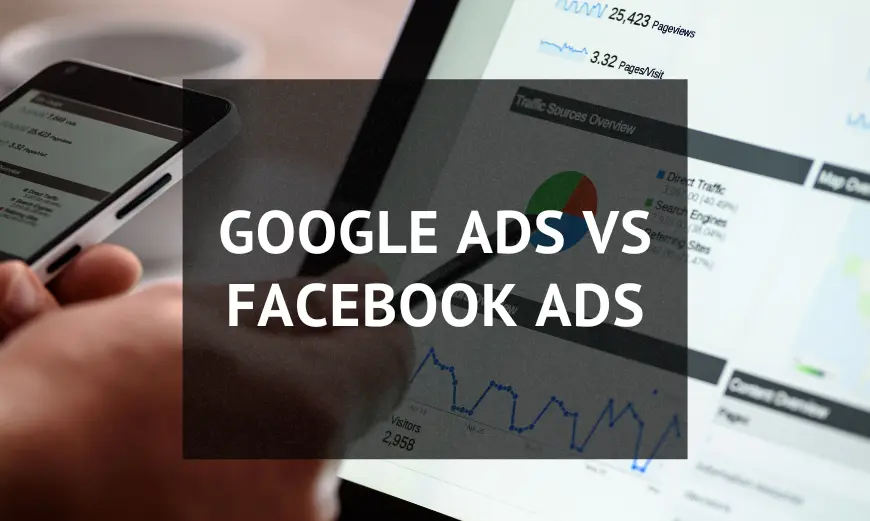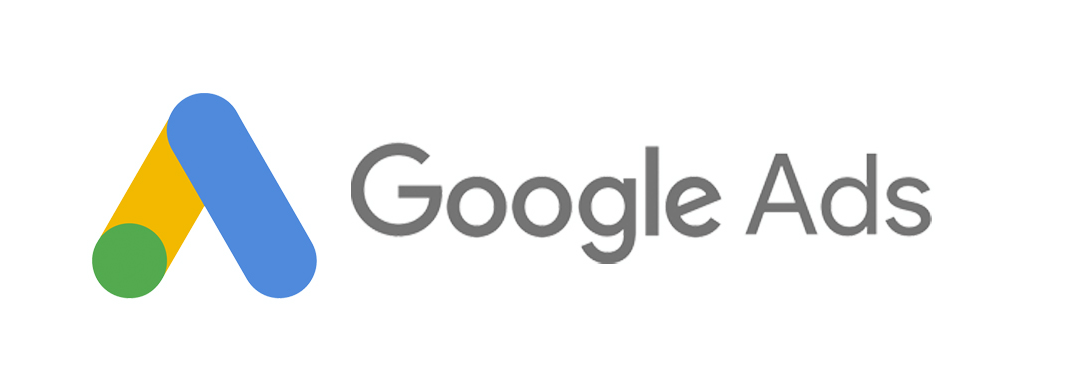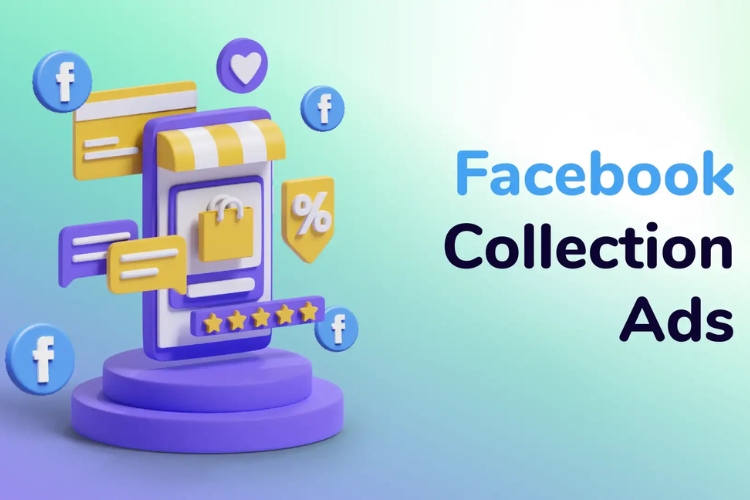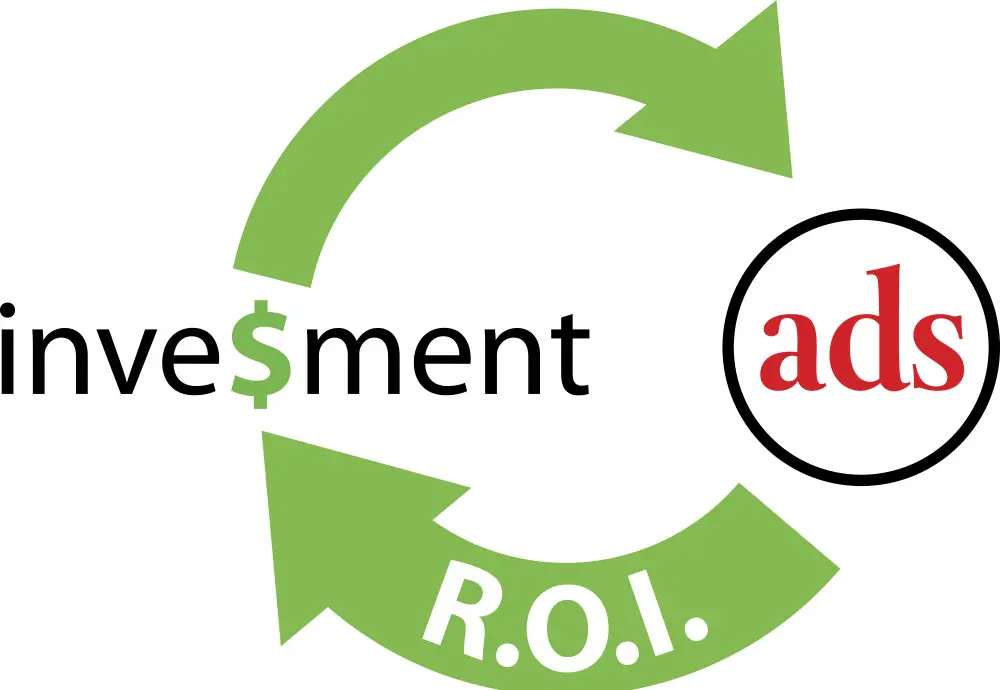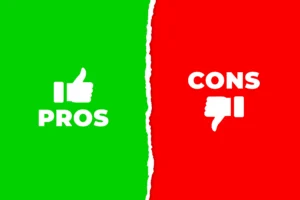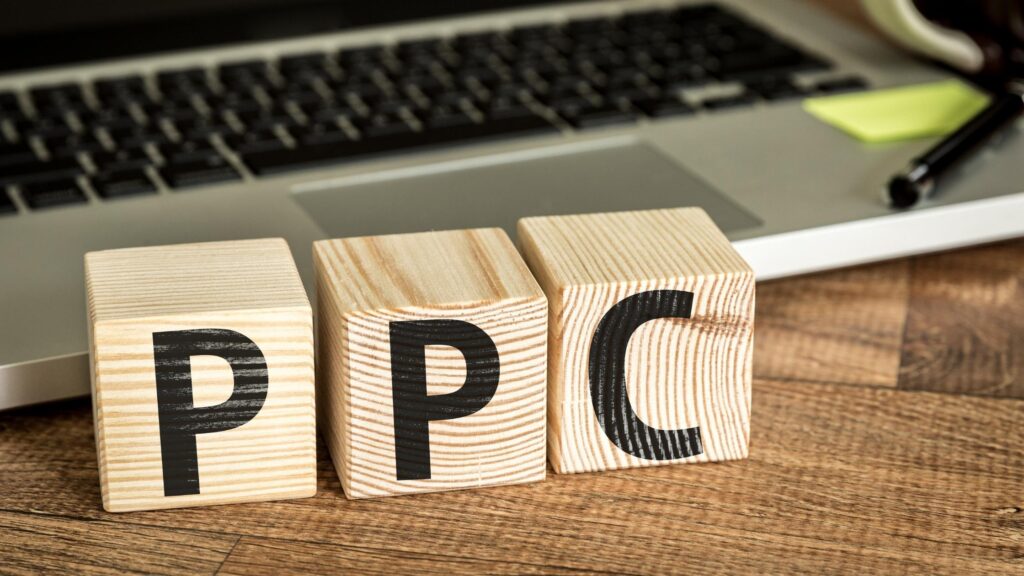Google ads vs. Facebook ads can be very confusing. You need to reach the right customers and get a profitable return on your investment. However, it can be difficult to choose the right paid advertising platform as both have different features and options.
It is not the end of the world. Instead, you need to dedicate your few minutes to this detailed article. You will get everything related to Google and Facebook ads. So you can decide which method is best for advertising your business and how you can start with it confidently.
Having this in mind, let us spill the beans on these paid advertisement platform comparisons. There is a lot to reveal and get the benefit of a successful PPC campaign.

What are Google Ads and How Do They Work?
Google ads are paid advertisements that appear when a user searches for a related keyword. These ads were previously called Google AdWords. You can find such ads in the:
- Google searches.
- Gmail and YouTube.
- Google Display Network.
It is one of the biggest pay-per-click advertising platforms. It means you (the advertiser) have to pay only when someone clicks on your ads and not when no one clicks on it.
But how do Google ads work?
It is as simple as a pie to understand.
The paid advertising of Google works by showing different types of ads according to what the user searches. For instance, your targeted audience will see Google ads in these different forms based on their type of search:
- Search ads to show text ads on the Google search results.
- Shopping ads to display products relevant to the audience’s needs.
- Display ads with images on various online platforms.
Advertisers can pay to target Google ads more effectively. They do so by using suitable keywords and factors like age, location, and income to reach the right audience.
What are Facebook Ads and How Do They Work?
Facebook ads are also paid advertisements shown on Facebook and Instagram. These ads are displayed according to the interests or behaviors of the targeted audience.
This way such Meta ads help you reach a wider audience and let them take your desirable actions. You can try these different types of Facebook ads to see what suits your audience best:
- Images
- Carousels
- Videos
And this is how Facebook ads work to help grab millions of eyeballs.
Facebook ads are a bit more targeted than Google ads. This is due to their ability to attract an audience based on their specific details like age, gender, location, or other interests.
You just need to create an ad, select your audience, and then set a budget. That is it!
Facebook will then start displaying ads to the users who match your criteria. As a result, you will start experiencing the benefits of these ads in either a few weeks or 3-6 months.
Lastly, an amazing fact about Facebook ads is that you can leverage both pay-per-click (PPC) and pay-per-impression (PPM) campaigns. In the second method, you have to pay per 1000 impressions.
7 Major Differences Between Google Ads and Facebook Ads?
Before proceeding ahead, you should know that both Google and Facebook ads are two paid methods of advertisement. You have to pay in both cases.
We wanted to clarify it because there are myths regarding the pricing of these advertising platforms. There might be a little difference between the overall cost of these ads. But none of them are free.
Now let us discuss the paid advertising platforms comparison. Here are the 7 major differences between Facebook ads and Google ads:
1. Size of Audience
There is way more difference between the audience size of the Facebook ads vs Google ads.
But do you know how many users are active on either Google or Facebook?
If not then you are missing a big opportunity of creating successful ad campaigns. This is because the number of active audiences on both of these ad platforms varies to a greater extent.
Around 8.5 billion people search on Google every day as compared to approx. 2.09 billion active Facebook users. Your audience can be on both platforms. But it is not necessary that they would be active too. So choose an ad platform wisely according to your audience.
Source: FreePik
2. User Intent
Next, is that Facebook and Google ads differ in terms of user intent. For instance, paid advertising on Facebook is called passive since Facebook displays ads to users even if they are not actively searching for them.
But Google ads are the active ones. They target a highly active audience, who are interested in buying something for real.
3. Ad Formats
There are different types of ad formats for Google ads according to the type and goal of your campaign. There can be search ads on the Google search results or display ads on other websites.
On the contrary, Facebook ad formats include images, videos, and carousels. Choosing any of them depends on your preferences.
4. Platforms
Google ads advertise in the search results and by displaying on different websites. However, Facebook ads use platforms like WhatsApp, Facebook, and Instagram to promote your business.
So think for a moment deeply and attentively about your business and its targeted audience. Then go for an ad platform accordingly.
5. ROI and Cost
The next difference is the advertising ROI for Google ads and Facebook ads. You have spent anything between $1.1 to $54.9 on the cost per click of Google ads. However, $2.6 is the average CPC for these ads.
On the flip side, Facebook ads cost you around $0.4-$3.7 per click. Therefore Google ads usually cost you more per click than Facebook ads.
But ROI measurements with metrics like CPA (Cost Per Action) determine whether the ads are worth the expense or not. Facebook ads have an average CPA of around $8.68 as compared to the CPA of Google ads ranging between $48.9-$75.5.
6. Budgeting
The cost of Google ads vs. Facebook ads also differs greatly. You have to pay more per click for the Google ads as compared to spending on the CPC of the Facebook ads.
But Google ads help you target people ready to buy. These automatically help in generating more sales. On the contrary, Facebook ads help you create brand awareness with their ability to reach a wider audience.
7. Targeting Options
Lastly, the targeting options in Google ads and Facebook ads are also different.
Google ads let you attract users on the basis of their searches for services, information, products, etc. These people are already searching for something specific. Thus they are more likely to buy from you.
On the other hand, Facebook ads target the target audience according to their interests, age, and other profile information. They are not guaranteed to buy anything after clicking on your ad.
Source: FreePik
Pros and Cons of Google Ads and Facebook Ads
But there are some good and bad of each paid advertising platform. Let us have a look at them to help you choose the best and most profitable choice:
Pros and Cons of Google Ads
You get to enjoy the given advantages with Google ads:
- Google ads spread your business to a wider and intended audience because it handles around 40,000 searches every single second.
- There are nine important campaign types of Google ads.
- No need for a high budget if you have impactful, helpful, and action-driven ads.
But the disadvantages of Google ads are:
- Complex setup and management.
- Expensive CPC in competitive fields.
Pros and Cons of Facebook Ads
Now, the advantages of Facebook ads are:
- Reach a specific audience according to their demographics, jobs, income, pets, and other interests.
- Create ads in visually appealing formats that stick in people’s minds.
- Get an exceptional return on your investment.
However, Facebook ads have these cons as well:
- Limited intent targeting.
- Higher costs for some industries.
So, Which is Better: Google Ads or Facebook Ads?
The final choice boils down to your own preferences. Facebook and Google ads are both effective platforms for paid advertisement. However, selecting the best one of them depends on your business goals and target audience.
Google ads are best for reaching people who are actively searching for any information related to your business. Google will show ads according to the selected people. However, Facebook ads allow you to create brand awareness. These ads connect you with people who are interested in your products or services even if they have not searched for it specifically.
FAQs About Google Ads vs. Facebook Ads
1. What about the conversion rate of Facebook ads vs. Google ads?
The conversion rate of Google ads is around 4.42% and that of Facebook ads is approximately 9.21%. Thus the chances of taking action through Facebook advertisements are more even though Facebook ads usually have fewer clicks than Google ones.
2. What are Google ads vs Facebook ads for dropshipping?
Google ads for dropshipping show your products on Google when people search for related products. So it helps you target the people who are actively looking to buy. On the other hand, Facebook ads show your dropshipping products to people based on their interests. This advertising allows you to reach a wider audience without targeting the ones genuinely interested in buying your things.
3. Which is better for real estate: Google Ads vs Facebook Ads?
Facebook ads for real estate business would be the best advertising option. Its reason is that putting your ads on Facebook will help you attract a specific audience according to their interests, demographics, and locations. This way you can reach the potential buyers more easily.
4. Can Google ads increase sales?
Yes, Google ads can definitely increase the sales, leads, or traffic of your website. It usually happens with a clickthrough rate (CTR) of more than approximately 10-15%. Getting this rate will automatically reduce the cost per click (CPC) and increase the quality of ads.
5. Who makes more money from ads, Google or Facebook?
Google helps you earn more money from ads as compared to Facebook ads. This is because of Google’s dominance in search and its ability to target the ads way more effectively.
6. Which is better: SEO or Facebook ads?
SEO wins in many areas over Facebook ads. This is due to the fact that users clicking on Facebook ads don’t always buy something. Instead, they hover over the link to just read content most of the time. However, strategic SEO techniques help you target a large audience who are interested in your products or business.
External Links:
[1] https://ads.google.com/intl/en_pk/home/
[2] https://www.wordstream.com/blog/ws/2022/10/05/types-of-google-ads
[3] https://www.facebookblueprint.com/student/path/219703-ads-manager-basics
[5] https://www.demandsage.com/google-search-statistics/
[7] https://www.googleadservices.com/pagead/
[8] https://www.wordstream.com/blog/ws/2016/02/29/google-adwords-industry-benchmarks
[10] https://support.google.com/google-ads/answer/13278730?hl=en
[11] https://www.internetlivestats.com/google-search-statistics/

